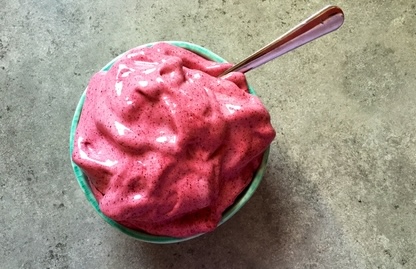When you crave sweets, depriving yourself of dessert can seem impossible. Seniors Guide offers healthy tips for your sweet tooth, including restaurant desserts and ice cream alternatives.
Restaurant Desserts
By Heidi McIndoo, MS, RD
When eating out, are you tempted to finish off the meal with something sweet? A dietitian offers healthy tips for your sweet tooth when dessert beckons.
Desserts as a topic? Since desserts aren’t nutritionally essential, you might think you should just skip them and you’ll be better off, right? While technically that may be true, eating as a whole should be a pleasurable experience and desserts can add to that pleasure. And like many foods, the key is getting away from the idea of good and bad foods and focusing on frequency and quantity. While a pint of ice cream every night won’t exactly fit into a healthy eating plan, a small, sweet treat once in a while can.
The issues when it comes to restaurant desserts versus something you might make at home are a combination of portion size and decadence. One serving can easily be two to three times the size of what you might serve yourself at home. Add to that the decadence of all of the butter, cream, sugar and more, and you end up with a dessert containing a meal’s worth of calories, nearly three days’ worth of saturated fat, and close to 40 teaspoons of sugar. While this is likely more than any one person needs at one time, there are strategies you can use to still enjoy a sweet ending to your meal without breaking your nutritional bank.
Helpful hints:
- Keep these ideas in mind next time you’re perusing the dessert menu.
- Share. Splitting a restaurant dessert between two or more people will allow everyone to end their meal on a sweet note without going overboard.
- Go down a size. Many restaurants have started offering mini versions of their classics. This is an ideal way to get what you desire, but less of it.
- Go simple. Fruit or a small serving of ice cream ends a meal nicely without too many calories, fat, and sugar.
Follow these tips for healthier holiday desserts
Smart Swaps for a Healthier Ice Cream Fix
By Kristen N. Smith, PhD, RDN
 Smooth, creamy, cool, and sweet – ice cream can be especially tempting. Here’s how you can “give in” without guilt.
Smooth, creamy, cool, and sweet – ice cream can be especially tempting. Here’s how you can “give in” without guilt.
Are you craving ice cream but watching your calories, sugar, or fat intake? Good news — there are plenty of lighter options that satisfy your sweet tooth without derailing your health goals.
Frozen yogurt is a classic alternative, offering less fat than traditional ice cream. Choose plain or low-sugar varieties and top with fresh fruit instead of sugary syrups. Greek yogurt “ice cream” delivers a creamy texture with extra protein and less sugar.
Fruit-based sorbets can be refreshing and lower in fat — just watch for added sugars. Or try blended frozen fruit bars, which often contain real fruit with minimal ingredients.
Banana “nice cream” is another favorite: just blend frozen bananas until smooth, adding a splash of milk or vanilla extract for flavor. It’s dairy-free, naturally sweet, and customizable with cocoa powder, peanut butter, berries, and more.
If browsing for store-bought options, look for low-calorie or low-sugar brands made with alternative sweeteners like stevia or monk fruit. Which of these options are you willing to try?
More tips for healthy frozen treats
Environmental Nutrition is the award-winning independent newsletter written by nutrition experts dedicated to providing readers up-to-date, accurate information about health and nutrition in clear, concise English. For more information, visit www.environmentalnutrition.com.
©2025 Belvoir Media Group, LLC. Distributed by Tribune Content Agency, LLC.
Read more helpful articles for great nutrition tips on Seniors Guide:
Controlling Sugar Cravings




